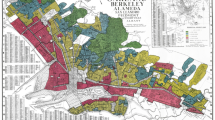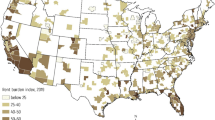Conclusion
There is evidence to suggest that subletting, as in other Third World cities, is playing a vitally important role in South African cities in accommodating people with low and unpredictable incomes. While it does not always offer an entirely acceptable form of accommodation when judged against the standards set by South Africa's housing goals, subletting can none the less provide particular advantages for poorer people. Given that acute housing problems will undoubtedly persist in South African cities for the foreseeable future, it can be assumed with some confidence that the important role of subletting is set to continue.
Subletting, therefore, clearly demands recognition in policy terms. However, the danger now appears to exist that subletting, as was the case with the śinformal sector’ of the economy, will be seized on by governments as offering a privatised solution to the particularly thorny problem of assistance for the urban poor. This certainly seems to be the approach of some currently dominant positions on housing policy. This paper puts forward a somewhat different policy position. Subletting must be formally recognised within a national housing policy as one of a range of housing options for the urban poor. As such, state intervention is required in order to contain particular negative aspects but primarily in order to facilitate the operation of subletting as a functional and flexible form of accommodation.
Similar content being viewed by others
References
Amis, P. 1984. Squatters or tenants: The commercialisation of unauthorised housing in Nairobi.World Development 12:87–96.
Andreasen, J. 1989. The poor don't squat: The case of Thika, Kenya.Environment and Urbanization 1:16–26.
De Loor, J. 1992.Housing in South Africa: Proposals on a Policy and a Strategy. Government Printer: Pretoria.
Dewar, D., Rosmarin, T. and Watson V. 1991. Movement Patterns of the African Population in Cape Town: Some Policy Implications. Urban Problems Research Unit Working Paper No. 44: University of Cape Town.
Dewar, D. and Watson, V. 1982. Public Housing Rentals: Some Issues. Urban Problems Research Unit Working Paper No. 22: University of Cape Town.
Edwards, M. 1982. Cities of Tenants: Renting among the Urban Poor in Latin America. In A. Gilbert, J. Hardoy, and R. Ramirez (eds),Urbanization in Contemporary Latin America. John Wiley: Chichester.
Edwards, M. 1990. Rental Housing and the Urban Poor: Africa and Latin America Compared. In P. Amis and P. Lloyd (eds),Housing Africa's Urban Poor. International African Institute: Manchester University Press.
Gilbert, A. 1991. Renting and the transition to owner occupation in Latin American cities.Habitat International 15:87–99.
— 1993.In Search of a Home: Rental and Shared Housing in Latin America. UCL Press: London.
Housing Research and Development Unit. 1980.Case Studies of Site and Service Schemes in Kenya. University of Nairobi.
Kabagambe, D. and Moughtin, C. 1983. Housing the poor: A case study in Nairobi.Third World Planning Review 5(3).
Mabin, A. 1990. Limits of the urban transition models in understanding South African urbanisation.Development Southern Africa 7:311–22.
Malpezzi, S. and G. Ball 1991.Rent Control in Developing Countries. World Bank: Washington, D.C.
National Housing Forum 1994. Inputs for item 3.3 of the draft framework for the White Paper on the RDP.
Palmer Development Group 1993. Backyard Living in Inner City Townships: A Survey of On-Site Access to Water and Waste Services. Draft Report for the Water Research Commission, Cape Town.
Ross, F. 1993. Houses without Doors: Diffusing Domesticity in Die Bos. Master's dissertation, Department of Social Anthropology, University of Cape Town.
UNCHS 1987.Case Study of Sites and Services Schemes in Kenya: Lessons from Dandora and Thika. United Nations Centre for Human Settlements: Nairobi.
— 1991.Evaluation of Experience with Initiating Enabling Shelter Strategies. United Nations Centre for Human Settlements: Nairobi.
Watson, V. 1994. Subletting: Towards an Appropriate Policy Response. Urban Problems Research Unit Working Paper (forthcoming): University of Cape Town.
Rights and permissions
About this article
Cite this article
Watson, V. Housing policy, subletting and the urban poor. Urban Forum 5, 27–43 (1994). https://doi.org/10.1007/BF03036684
Issue Date:
DOI: https://doi.org/10.1007/BF03036684




